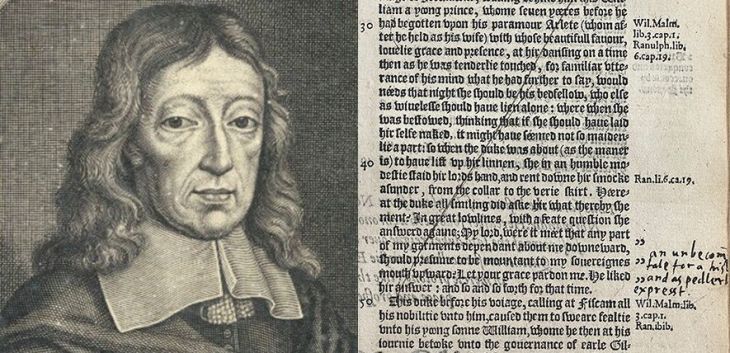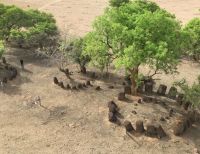The discovery was made thanks to the Arizona Book History Group, a research forum at the Phoenix Public Library organized by Assistant Prof. Brandi Adams and Prof. Jonathan Hope, both from Arizona State University’s Dept. of English. Adams and Hope raised funds for four visiting scholars to study books in the library’s Alfred Knight Collection.
In March 2024, these researchers included the two other authors of this study: Dr Aaron Pratt, Curator of Early Books & Manuscripts at University of Texas; and Claire Bourne, an associate professor of English at Penn State.
Holinshed's Chronicles, bound in two hefty volumes, was among a number of books that the researchers requested to see.
On 1st March, Dr Pratt noticed a surprising little “e” in notations added to the book. “I was like, ‘God, there’s no way in hell this is true, but it kind of looks like this stupid way Milton writes ‘e’,” Pratt said.
Intrigued, Pratt kept looking and started seeing scratchy brackets with notations in the margins, brackets that looked very similar to those found in one of the two other known books with Milton’s handwriting, Shakespeare’s First Folio, which Bourne and Scott-Warren found in 2019 in the Philadelphia Free Library.
Bourne started to compare the annotations in Holinshed’s Chronicles with those in the Shakespeare Folio. “We’re kind of going back and forth, like, is that double ‘l’ similar? Is that double ‘s’ similar?” Bourne said.
Bourne then texted photos of the handwriting and brackets to Jason Scott-Warren, Director of the Cambridge Centre for Material Texts and a Fellow of Gonville and Caius College.
In 2019, Scott-Warren identified Milton as the annotator of a copy of the Shakespeare First Folio in the Free Library of Philadelphia, building on Bourne’s research. Academics and media reports called this one of the most important literary discoveries of modern times. Since then, the pair have employed research assistants to look for other surviving books from Milton’s library, with no luck.
Bourne wasn’t sure how Scott-Warren would respond to the Holinshed notations, describing him as “very conservative” when it comes to reaching such verdicts. But his reply was rapid and enthusiastic: “Wow. Bingo!”
















